- Home
- Departments
- Emergency Management
- Local Hazards
Local Hazards
Hazards are faced on a daily basis - some we can anticipate while others come without warning. Regardless of the hazard, educating yourself and your loved ones and taking neccesary precautions in advance can make the difference in an emergency. If you have not already done so, Make a Plan and assemble Go Kits and Shelter in Place Kits for everyone in your household. For more information contact the Nassau County Office of Emergency Management at (516) 573-0636. The time is now.
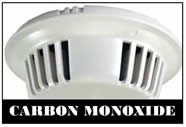 | 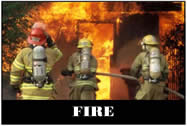 | 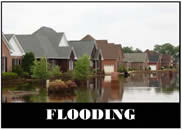 |
 | 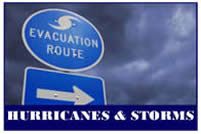 | 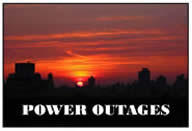 |
Carbon Monoxide
Carbon Monoxide is an odorless, colorless gas that can cause sudden illness and death. Each year over 500 American die from Carbon Monoxide poisoning and thousands of others experience headaches, dizziness, nausea and vomiting from exposure. People who are sleeping or intoxicated can die from CO poisoning before ever experiencing any symptoms. You can prevent Carbon Monoxide Poisoning by installing a battery operated CO detector in your home and check or replace the battery when you change the time on your clocks each spring and fall.
If You Suspect Carbon Monoxide Poisoning
- Leave your home
- Call 911
- Get any victims to fresh air immediately
- Open windows
- Call your local utility
Tips for Preventing Carbon Monoxide Poisoning
- Install a battery operated CO detector in your home and check or replace the battery when you change the time on your clocks each spring and fall.
- Do not use portable flameless chemical heaters (catalytic) indoors. Although these heaters don't have a flame, they burn gas and can cause CO to build up inside your home, cabin, or camper.
- If you smell an odor from your gas refrigerator's cooling unit have an expert service it. An odor from the cooling unit of your gas refrigerator can mean you have a defect in the cooling unit. It could also be giving off CO.
- Have your chimney checked or cleaned every year. Chimneys can be blocked by debris. This can cause CO to build up inside your home.
- Never use a gas range or oven for heating.
- Never use a charcoal grill or a barbecue grill indoors.
- Never use a generator inside your home, basement, or garage or near a window, door, or vent.
- Never run a car or truck in the garage with the garage door shut. CO can build up quickly while your car or truck is running in a closed garage. Never run your car or truck inside a garage that is attached to a house and always open the door to any garage to let in fresh air when running a car or truck inside the garage.
Fires
All homes should be equipped with properly working smoke detectors. Approximately 2/3 of all Home Fire Deaths, result from fires in homes with no smoke detectors, or non working smoke detectors. Smoke detectors should be placed in each bedroom, outside each sleeping area, and on all levels of the home. Hard wired smoke detectors need to have a battery back up, in the event of power failure; smoke detectors should be tested once a month, and the batteries should be changed any time a chirping noise is heard, and when you change your clocks for daylight savings time. It is vital that all residents in the home familiarize themselves with the sound of the smoke detectors, and know what to do when the alarms sounds. Family members must develop a Home Fire Escape Plan, which they practice monthly. All rooms should have two ways out, with doors and windows free of obstruction. Once outside of the home, all family members must be aware of the pre determined meeting place, and should not reenter the home for any reason. If any member of the family or pet is still inside, it is vital to tell Firefighters upon their arrival.
To help prevent Home Fires, residents should never smoke in bed, or when under the influence of drugs or alcohol. When cooking, residents should not cook when tired, under the influence of drugs or alcohol, or when wearing loose clothing. Unattended cooking is the primary cause of Home Cooking fires. When walking away from the stove, it is vital to turn off all burners. BBQ grills should only be used outside, in a clean safe location, away from all structures. When cooking or using a BBQ, keep children away to prevent fires and injuries. Before using a propane grill always check each fitting, grease pans, and the tank itself for defects and leaks. When utilizing candles in the home, never use close to curtains, paper, plastic, or in a location where it could be knocked over, or cause a burn.
Portable fire extinguishers have limits in their capacity to put out fires. Call the fire department if there is a fire. As a general rule, firefighting should be left to the experts. Only use a fire extinguisher if you have been trained to do so. Practice how to use fire extinguishers before a fire occurs. If your clothes catch fire, STOP, DROP, AND ROLL. Stop immediately, drop to the ground, and cover face with hands. Roll over and over or back and forth until the fire is out. If you use a wheelchair, scooter or other device and are able to get to the floor, lock the device first to stay in place before getting on the floor to roll until the flames are out. Use cool water to treat the burn immediately for 3 to 5 minutes. Cover with a clean, dry cloth. Get medical help right away. Fire Safety Drills and practices must be understood and demonstrated by all members of the family to prevent a tragedy. Residents can feel free to contact their local fire department in order to request an evaluation of their home. This pre-planning allows the fire department to know the layout of your home and can pin point places of access as well as point out potential hazards.
Flooding
Anywhere it rains, it can flood. Just because you have not experienced a flood in the past does not mean you will not experience one in the future. Flooding can happen any time of year and for a number of different reasons including Heavy Rain, Spring Thaw, Hurricanes, and Flash Flood. Nassau County participates in the Nation Flood Insurance Program. Visit FloodSmart.gov or call the Office of Emergency Management at (516) 573-0636.
Flu
Two strains of flu, seasonal flu and the H1N1 (Swine) flu, are currently circulating in the United States. Most healthy people recover from the flu without problems, but certain people are at high risk for serious complications. Flu symptoms may include fever, coughing, sore throat, runny or stuffy nose, headaches, body aches, chills and fatigue. In H1N1 flu infection, vomiting and diarrhea may also occur. Annual outbreaks of the seasonal flu usually occur during the late fall through early spring. For the 2009-2010 flu season, the H1N1 flu virus caused more illness in young people and pregnant women than is usual for prior flu seasons. Like seasonal flu, illness in people with H1N1 can vary from mild to severe. The best way to prevent the flu is by getting a flu vaccination each year.
Get Vaccinated. Vaccination is the best protection against contracting the flu. For the 2010-2011 flu season, most people with need just one shot to be protected against both seasonal and H1N1 flu.
For more information visit flu.gov
Hurricanes & Storms
Constant threats faced on Long Island are Hurricanes and Nor'Easters. Although we have not experienced a devastating Hurricane on Long Island in some time, that was not always the case. While Nor'Easters may not reach the threshold to be considered a hurricane, their destructiveness can be devastating.
It is estimated that over 300,000 residents in Nassau live in flood zones. Know your Coastal Evacuation Routes and look purchase Flood Insurance even if you don't live in a Flood Zone. If you are told to evacuate, it is critical that you listen to the authorities. Make a plan for you and your family and take into consideration those with special needs and pets.
In case of power outages, have a battery operated radio, flashlights with extra batteries, enough non-perishable food and water to last you and your family 7 days, cash in small bills, a 2-weeks supply of medications and anything else you and your family may need in an emergency.
To learn more about how you can prepare for a Hurricane, please see our reference materials and contact the Office of Emergency Management at (516) 573-0636.
Power Outages
Power Outages can occur any time of year and for a variety of different reasons – usually without any notice. Power Outages can occur due to all types of weather incidents including lightning, high wind, heavy rain, ice and snow. In addition, trees coming in contact with power lines, mechanical failures and cars hitting electric poles.
In case of a Power Outage, it is crucial to always be prepared with an emergency kit. Have enough water and non-perishable food to last you and your family for 7 days, a battery operated radio, flashlight with extra batteries, two weeks supply of medications and anything else you and your family may need in an emergency. Power outages can last a few minutes or a few weeks so be prepared.
To report a power outage, contact LIPA at (800) 490-0025.
LIPA's Critical Care Program is available for those living at home on life support. For more information on this program or to register, please call (800) 490-0075.
For more information on planning for Power Outages, contact the Office of Emergency Management at (516) 573-0636.
Extreme Heat
View, download or print the Heat Alert flyer (PDF)
During summer months, temperatures in Nassau County can exceed 90 and 100 degrees at times. Knowing how to cope in such extreme heat can mean the difference between life and death. Those at the highest risk for heat related death are the elderly, very young, people with mental illness and chronic diseases. However, even young and healthy people can get sick form the heat if they participate in strenuous physical activity during hot weather.
Steps to Take During Hot Weather
- Stay cool indoors.
- Drink plenty of fluids.
- Replace salt and minerals.
- Wear appropriate clothing and sunscreen.
- Schedule outdoor activities carefully.
- Pace yourself.
- Use a buddy system.
- Monitor people at high risk.
- Adjust to the environment.
- Do not leave children in cars.
- Use common sense
Preparing for Winter Weather
Every household should be equipped with a Disaster Supply Kit. Be sure to include the following:
- Rock Salt to melt ice on walkways
- Sand to maintain traction
- Snow Shovels and other snow removal equipment
Prepare Your Home & Your Family
- Prepare for possible isolation in your home by having sufficient heating fuel. Include storing a good supply of dry, seasoned wood for your fireplace or wood-burning stove.
- Winterize your home by insulating walls & attics, caulking & weather-stripping doors & windows, installing storm windows or covering windows with plastic.Clear rain gutters; repair roof leaks and cut away tree branches that could fall on a house or other structure during a storm.
- Insulate pipes with insulation or newspapers and plastic & allow faucets to drip a little during cold weather to avoid freezing.
- Keep fire extinguishers on hand and make sure everyone in your house knows how to use them. House fires pose an additional risk, as more people turn to alternate heating sources without taking the necessary safety precautions.
- Learn how to shut off water valves (in case a pipe bursts).
- Hire a contractor to check the structural ability of the roof to sustain unusually heavy weight from the accumulation of snow - or water.
Prepare Your Car&Mdash;Check or Have a Mechanic Check the Following Items on Your Car:
- Antifreeze levels - ensure they are sufficient to avoid freezing.
- Battery and ignition system - should be in top condition and battery terminals should be clean.
- Brakes - check for wear and fluid levels.
- Exhaust system - check for leaks / crimped pipes and repair or replace as necessary. Carbon monoxide is deadly with no warning.
- Fuel and air filters - replace and keep water out of the system by using additives and maintaining a full tank of gas.
- Heater and defroster - ensure they work properly.
- Lights and flashing hazard lights - check for serviceability.
- Oil - check for level and weight.
- Thermostat - ensure it works properly.
- Windshield wiper equipment - repair any problems and maintain proper washer fluid level.
- Install good winter tires. Make sure the tires have adequate tread.
- Maintain at least a half tank of gas during the winter season.
- Place a winter emergency kit in each car with a shovel, windshield scraper / small broom, flashlight, battery powered radio, extra batteries, water, snack food, matches, extra hats, socks and mittens, first aid kit with pocket knife, necessary medications, blanket(s), tow chain or rope, road salt / sand, booster cables, emergency flares, fluorescent distress flag
Fire Safety:
- Use only portable heating equipment that is approved for indoor use.
- Keep combustible materials, including furniture, drapes, and carpeting at least three feet away from the heat source. NEVER drape clothes over a space heater to dry.
- Never leave children alone in the room where a space heater is running. Turn it off when you are unable to closely monitor it.
- Be careful not to overload electrical circuits.
- Make sure you have a working smoke detector in every room. Check and change batteries often.
- For Wood-burning stoves, fireplaces and heaters:
- Always keep a screen around an open flame.
- Never use gasoline to start your fireplace.
- Never burn charcoal indoors.
- Do not close the damper when ashes are hot.
- Have your chimney checked before the season for creosote buildup -- and then clean it.
- Have a working fire extinguisher and smoke detectors Establish a well-planned escape route with the entire family.
- CARBON MONOXIDE SAFETY—CO Poisoning is a silent, deadly killer claiming about 1,000 lives each year in the US.
- NEVER run generators indoors.
- NEVER use charcoal to cook indoors.
- NEVER use a gas oven to heat your home.
- Install a carbon monoxide detector in your home and check it regularly to make sure the battery is working.
- Make sure your heating system is kept clean and properly vented; have worn or defective parts replaced.
- Don't heat your home with a gas stove or oven.
- Do not use any gas-powered appliance, charcoal grill, or hibachi indoors.
- Open your garage door before starting your car and do not leave the motor running in an enclosed area. Clear exhaust pipes
- before starting a car or truck after it snows.
- The most common symptom of carbon monoxide poisoning is headache. Symptoms may also include dizziness, chest pain, nausea, and vomiting. In severe cases, people can become increasingly irritable, agitated and confused, eventually becoming lethargic and lapsing into unconsciousness.
- If you suspect carbon monoxide poisoning, call 911, and get the victim to fresh air immediately, and open windows.
- If you lose heat or power, take measures to trap existing warm air, and safely stay warm until heat returns:
- Insulate your home - hang blankets over windows and doorways and stay in a well-insulated room while power is out.
- Dress warmly. Wear hats, scarves, gloves, and layered clothing.
- If you have a working fireplace, use it for heat and light, but be sure to keep the damper open for ventilation.
- Open your faucets to a steady drip so pipes do not freeze.
- Eat! Food provides your body with needed energy to produce its own heat and drinking helps your body avoid dehydration.
- If the cold persists and your heat is not restored, call family, neighbors, or friends to see if you can stay with them.
Generator Safety:
Electric generators can provide you with piece of mind and convenience when you are faced with a temporary loss of electricservice. Follow these safety guidelines when operating a generator:
- Before installing a generator, be sure to properly disconnect from your utility electrical service. Have your generator installed by a qualified electrician.
- Run generators outside, downwind of structures. NEVER run a generator indoors. Deadly carbon monoxide gas from the generator's exhaust can spread throughout enclosed spaces. Install a carbon monoxide detector.
- Fuel spilled on a hot generator can cause an explosion. If your generator has a detachable fuel tank remove it before refilling.
- If this is not possible, shut off the generator and let it cool before refilling.
- Do not exceed the rated capacity of your generator. Most of the small, home-use portable generators produce from 350 to 12,000 watts of power. Overloading your generator can damage it, the appliances connected to it, and may cause a fire. Follow the manufacturer's instructions.
- Keep children away from generators at all times.
Snow Blower Safety
- Be sure to read your owner's manual and follow these tips:
- Never leave your snow blower running and unattended.
- Make sure the discharge chute is not aimed at passing motorists or pedestrians.
- Never put your hands into the discharge chute or augers to clear stuck snow and ice.
- Never add fuel when the engine is running and hot.
- Make sure you know how to turn the machine off quickly.
- Dress for the Weather
- Wear several layers of loose fitting, warm clothing. The outer garments should be tightly woven and water repellent.
- Wear mittens and a hat. Mittens are warmer than gloves.
- Cover your mouth with a scarf to protect your lungs.
- Avoid overexertion when shoveling snow. Overexertion can bring on a heart attack—a major cause of death in the winter.
- Keep dry. Change wet clothing frequently to prevent loss of body heat.
- Watch for signs of frostbite. These include loss of feeling and white or pale appearance in extremities such as fingers, toes, ear lobes, and the tip of the nose. If symptoms are detected, get medical help immediately.
- Watch for signs of hypothermia. These include uncontrollable shivering, memory loss, disorientation, incoherence, slurred speech, drowsiness and apparent exhaustion.
- If symptoms of hypothermia are detected: get the victim to a warm location, remove wet clothing, put the person in dry clothing and wrap their entire body in a warm blanket, warm the center of their body first, give warm non-alcoholic or non-caffeinated beverages if the victim is conscious and get medical help as soon as possible.
Contact Us
-
Richard Corbett
Commissioner
Jeffrey Sattali
Deputy Commissioner
Office of Emergency Management
510 Grumman Road W.
Bethpage, NY 11714Ph: 516-573-9600